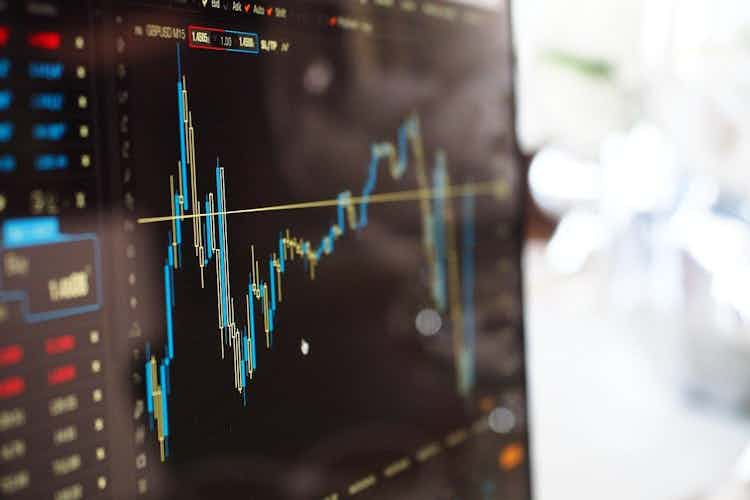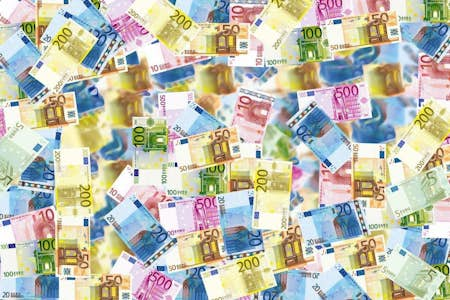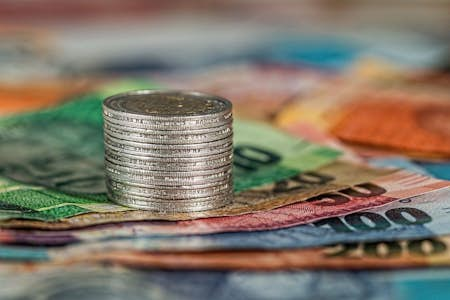The Forex market offers investors a potential opportunity to generate returns in the short term and long term. However, just because it can create profits, that does not necessarily mean it will. Like any financial market, currency trading has the potential for significant losses. Read on to learn why and how Forex trading can be profitable, what its risks are, and how to help yourself make highly profitable foreign exchange trades while minimising risk.
Discover the UK's leading investment platforms, whatever your investment goals. Click on a provider below to get started!
What can make Forex trading profitable?
There are many reasons why the currency markets are an attractive prospect for experienced Forex brokers, retail investors, and currency traders in general.
Arbitrage
Arbitrage is when an investor buys and sells the same asset simultaneously but in different markets and at different prices. In doing so, the investor profits from the price difference. When it comes to arbitrage in the foreign exchange market, profits are made by exchanging two different Forex pairs at the same time. The cyclical nature of the trades makes profits from imbalanced exchange rates.
Take one hypothetical example of exchange rates. You see the following currency prices:
EUR/USD = 1 Euro is 0.6 US Dollars
EUR/GBP = 1 Euro is 0.7 US Dollars
USD/GBP= 1 US Dollar is 1 British Pound
You would buy 1 Euro with 0.6 US Dollars, which would cost you 0.6 British pounds as a British investor. You can sell your 1 Euro for 0.7 British Pounds.
In this hypothetical example, you have made the vast sum of 0.1 British pounds, or 10p.
You have to buy and sell your assets simultaneously to ensure the market does not correct itself and eradicate the arbitrage opportunity by rebalancing. Arbitrage opportunities disappear quickly as many operating in foreign currency markets are looking for them. As a result, these opportunities are quickly taken advantage of, and the increased trading of the currency pairs in question eradicates the arbitrage opportunity.
Fast-paced market
As mentioned, many people trading capital within the foreign exchange market. As a result, and due to the nature of what is being bought and sold, Forex is a fast-paced market - even more so than the stock market. Plus, the currency markets are often for longer. For example, it is generally possible to trade Forex 24 hours a day, five days a week.
Particularly with very common currency pairs (like USD/GBP, EUR/USD, GBP/EUR), you can buy or sell assets almost instantaneously. While that may put a great deal of pressure on you or other retail traders to stay abreast of market movements, it also presents an opportunity. The longer you have to trade, the more chance you have to make money. You have more time to make profits, which is quicker still down to the fast-paced nature of the asset.
That maximises the chance for profitable trades as you can exit positions or enter them at the exact point you want. That cannot even be said of trading stocks, another fast-paced market. The result is that you give yourself more of a chance of placing winning trades.
Competitive fees
One aspect of forex trading that cannot be overlooked is how fees can impact returns. You should be well aware of brokerage fees before making an initial deposit with a broker - even when trading other assets. This is imperative with Forex trades for several reasons.
Firstly, Forex trading often requires a higher frequency of trades to make the most of price fluctuations. For that reason, if your fees are not optimally structured with your broker, you could be incurring far higher costs than you need every time you enter or exit a position.
Secondly, Forex trading makes money on the margins or differences between currency spot prices. Brokers often make their money on foreign exchange by offering an exchange rate that doesn't quite match the spot rate. To make more money, brokers can provide a bad spread, while offering a tighter spread means they make less of a profit on your trade, while you benefit.
Forex trading is, therefore, more likely to be profitable if you set up an account with a Forex broker that offers a competitive fees structure. It means you pocket far more of your profit than with brokers whose services are more expensive and not necessarily of better quality.
What risks are associated with Forex trading?
Despite the many advantages of Forex trading, there is still a considerable potential to make losses, and large ones at that. However, by identifying the risks and knowing what they are, you will be better placed to mitigate them. Or, of course, you may find that when you have considered these risks, it makes for far better money management to give Forex trading a miss for the time being.
Volatility
Volatility is a factor that all Forex traders must consider when buying and selling currencies. While the fast-paced nature of the market is one of its most significant advantages, it does create a great deal of volatility too. As a result, it can make it far harder to predict what the market will do and, therefore, more challenging to make appropriate investment decisions.
However, many traders use volatility as a means to make money. By increasing the number of trades they make per day, a Forex trader attempts to smooth out the volatility in the market and makes the most of small price swings. The more transactions a high-frequency trader makes, the more chance they have of pocketing profits before volatility can wipe out those gains.
Leverage
Because of the small changes in prices between currencies (as evidenced by our hypothetical 10p profit above), many Forex traders seek to maximise their gains by leveraging their positions. By borrowing more money to invest, it is possible to take bigger positions, which means more significant profits. However, it also means more significant losses if a trade does not go the way an investor had imagined.
Of course, leveraging is a manageable risk to mitigate against if you so wish. You can choose not to leverage your position. However, given the tiny movements in prices that you are trying to make profits from, it means that any meaningful, absolute returns you make may take a while to build up.
What are the most common Forex trading strategies?
Many Forex trading strategies can help minimise the number of losing trades made to maximise the money made when trading foreign currency. In addition, having a trading plan can help an investor ride out any losses or volatility as there is a longer-term strategy to help build up a trading account.
Buy and hold
While Forex markets are rife with investors implementing racier investment strategies than the classic buy and hold, it is still possible to make returns by implementing this tactic. The underlying idea is just the same as it is for any other asset. You buy it at a lower price than you think it is worth and then hold on to it to sell it at a price you think it can reach. Your profit is the difference.
The only difference with currencies is that it happens inversely. With Forex, you buy an undervalued currency and sell it when you think it has reached its potential—for example, buying £1 worth of Euros for €1.20. Then, when the Euro moves to the price you believe it is worth, you exchange it back to Pounds. Say it moves to €1.10. You exchange the €1.20 you buy and receive back almost £1.10.
Scalping
Scalping is a common trading strategy that is in direct opposition to a buy and hold strategy. Scalpers hold currencies for a very short period by buying and selling currencies frequently throughout the day. To make meaningful profits throughout the day, a cumulative effect is created from trading multiple times. However, many Forex traders will maximise each return through leverage or by increasing the size of the trade. The hope with this trading strategy is that the trader increases the number of profitable trades made while minimising losses by buying and selling positions quickly. This approach means currencies have less time to make significant movements either way. However, just as there is an increased potential to make a sizeable cumulative return, there is also the potential to make more considerable cumulative losses.
Derivatives and CFDs
Many Forex traders implement high-risk trading strategies that leverage their positions and use derivatives and CFDs to help maximise returns. Anyone who reads the disclaimer for CFD products will know that CFDs and derivatives can magnify losses because they are immediately leveraged financial instruments. CFDs allow investors to bet on the direction of the price move they believe will occur and profit from the difference between the settlement price and the opening position. Traders never actually own the underlying asset, and the same can be said of derivatives. This strategy is the process of making money from something you never owned.
The high risk comes from the fact that losses can be magnified due to the leverage. Those losses are then made even worse due to the increased likelihood that a trade will move differently from what an investor initially thought.
Ways to become a successful Forex trader
Beginners will benefit by ensuring they make the most of the tools at their disposal. If you are a beginner, make sure that you help yourself be successful and take advantage of the right fluctuations and price movements, with the following factors:
Choosing the best trading platform
Your chosen trading platform or Forex broker can really make all the difference between being a successful Forex trader or an unsuccessful one. All trading platforms promise the same thing: the ability to trade effectively. However, all trading platforms are, in practice, very different. As a result, there will be some that suit you better than others. For example, you may find that some Forex trading platforms have a more intuitive interface. Or you may find that some trading platforms help you integrate Forex more easily into your broader portfolio.
The most important thing for any investor is that a trading platform supports and promotes making a well-placed and well-timed trade. If it impedes that ability, it can adversely affect your ability to generate profits and returns. You could also look for platforms that allow you to use features like a Forex cent account, which can help you get used to trading by starting with very small amounts.
Taking advantage of demo accounts
If you are unsure what trading platform will work best for you, make sure you utilise a provider's demo account feature. Not all trading platforms or brokers will offer such a provision, but ensure you make the most of it if they do. Play with the software, make sure you know the layout of an application and fully grasp how a trading platform's fees affect your returns. Demo accounts can help you discover any difficulties before you start trading in reality, making you a better investor when you begin trading currency pairs properly.
Undertaking technical analysis
Your trading platform or even your broker may be able to help you conduct technical analysis. Doing so means you are carrying out extensive research to help support making profitable trades. Technical analysis is one means that individual traders have at their disposal to unearth hidden information that is currently publicly available. That information and data mean an investor can make a more informed decision that is more likely to be correct. Better trades can then be placed, and more consistently too.
Choosing risk management strategies
Stop-loss orders and other risk management strategies can be good ways to help you become a successful Forex trader. While these risk management tools may not, ultimately, increase your returns, they can at least limit them. That's important given the amount you can lose during a Forex trade. By putting in a stop-loss order, for example, you are putting a mechanism in place on your trading platform or with your broker that at least means you only lose as much as you are comfortable losing.
Is trading Forex profitable?
We spoke to Richard from Able-Trading.com, who told Pension Times: "Forex trading can supplement income (or replace it in some cases) so for a new revenue stream into a pension it can absolutely work when approached in the right way.
"As covered in the article, all speculation in the financial markets includes a high degree of risk but it doesn't have to be as risky as some may suggest. The highest degree of risk comes from not educating oneself on how to trade with the correct risk management framework. For example - I rarely risk more than 1% of my account on any one trade and seek to at least double that return. That way you can be wrong 50% of the time and still make a healthy return.
"The aim of the game is to protect capital whilst growing over the longer term. You can greatly improve on the banks' interest rates offered on savings and my wife and I use an account to grow our own pension. It's safe to say that Forex trading is an option for investing in the long term. The important part is to learn how to do that safely from a proven and reliable source."
In summary, trading Forex can be a profitable venture. However, it can also be an investment that poses a significant risk of loss. As an investor, it is up to you to consider the pros and cons of Forex trading in relation to your own circumstances and risk tolerance or appetite. It could be that you can take on a large amount of risk, or you may not want to take on much risk even if you do have a large cash buffer. If you are nearing retirement, you need to think about how your shortening investment horizon limits your ability to make back any losses made, and whether that is a risk you are either willing or need to take.







